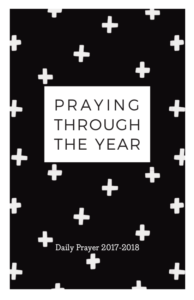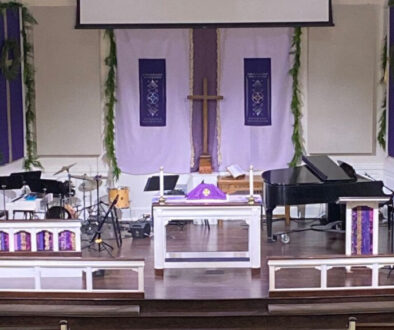Why do we pray scripted prayers?

Last week we handed out a simplified version of our Anglican Book of Common Prayer called Praying through the Year. We’ve loved hearing the ways many of you are integrating this booklet into your daily life. We will have more copies of this resource available on Sunday in the narthex, and we’d love for you to take one home.
But some of you may wonder why we use scripted prayers at all. Why not pray from our thoughts and feelings and impressions? Isn’t scripted prayer needlessly rigid and archaic? Two responses come to mind.
The first response is that both modes of prayer are great and have their place in our lives. In fact, The Book of Common Prayer always leaves space for “free intercessions” in its liturgies, a place for the extemporaneous prayer to which many of us are accustomed. Using scripted prayers doesn’t replace unscripted prayers or all the wonderful, surprising ways the Holy Spirit shows up in them. Instead, it complements them, rooting them in the words of Scripture and of Christians who have prayed before us through the ages.
The second response, though, is a story from my own experience. A little over a decade ago, I nearly abandoned my faith. I was consumed by doubts I couldn’t reconcile; I was tired of Christians whose lives were squeaky clean but who cared little about justice and mercy; and I was crowding God out of my life by pouring myself into a career that tempted me with moral compromises. For over a year, I didn’t read scripture and I didn’t pray. And I didn’t care. I told God that I barely believed this stuff anymore, but that if it was true, he was going to need to convince me himself.
And he did. Late one night, I was anxious and sleepless and found myself really wanting to cry out to God, but I realized that I’d forgotten how. A phrase from the Sunday liturgy popped into my brain: “whose property is always to have mercy” (we now use the words, “who always delights in showing mercy”). That seemed as good a prayer as any, so I simply prayed it, over and over, to God: “Your property is always to have mercy. Your property is always to have mercy.” As I did, I realized that if God’s property is always to have mercy, then he had mercy for me in that moment, and in every faithless, cynical moment that had preceded it.
That sustaining thought carried me through a long night of anxiety to the morning. And it carried me through the next night, and the next. It marked the beginning of my returning to God, re-discovering that ‘the stories are true,’ and re-learning how to pray. It also marked the beginning of my use of The Book of Common Prayer as a regular part of my prayer life.
For someone like me, who easily lives inside my thoughts, the pressure to manufacture extemporaneous prayers can feel like a chore and a performance. And when I’m tired or uninspired or consumed with doubts, it’s barely possible. Instead, I found a liberating self-forgetfulness in The Book of Common Prayer, as I began to lean on the words and faith of the millions of Christians who had gone before me, who had prayed these prayers for centuries to sustain their faith. One of the gifts of being Anglican has been discovering this weird and wonderful fellowship with Christians throughout time and space whose prayers support my own.
These days, I do both: I pray scripted prayers in a more-or-less regular rhythm, and I pray extemporaneous prayers that vary from the transcendent to the absurd (“help me find a parking spot, Jesus!”). I think both kinds of prayer delight God, both draw me into a pattern of daily dependence and closer relationship, and both connect me to a global community of other praying Christians.
This Advent, we’d love for you to join us in adding scripted prayer to your daily rhythms. Pick up Praying Through the Year on Sunday!




December 8, 2017 @ 4:13 pm
Thanks for sharing, Amy!
December 8, 2017 @ 7:43 pm
Thanks Amy….I fully relate to your comment about living easily inside your thoughts and about difficulty in extemporaneous prayer.